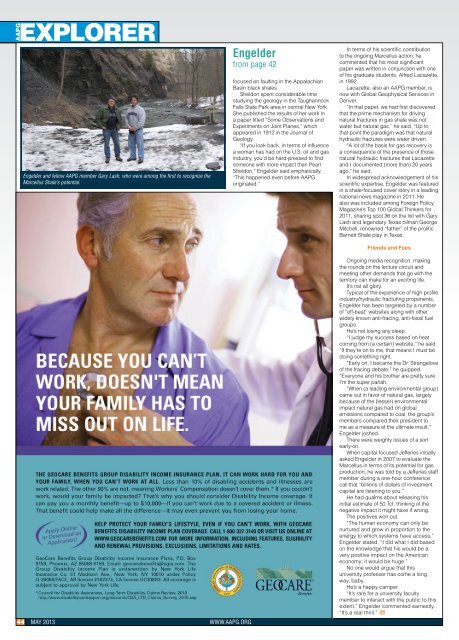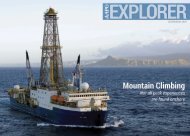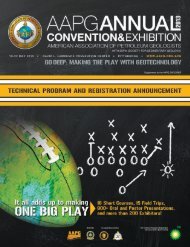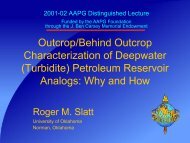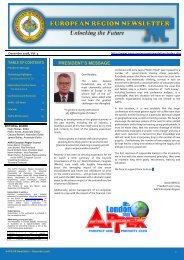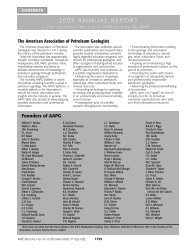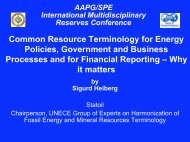Download - American Association of Petroleum Geologists
Download - American Association of Petroleum Geologists
Download - American Association of Petroleum Geologists
You also want an ePaper? Increase the reach of your titles
YUMPU automatically turns print PDFs into web optimized ePapers that Google loves.
AAPG<br />
EXPLORER<br />
Engelder and fellow AAPG member Gary Lash, who were among the first to recognize the<br />
Marcellus Shale’s potential.<br />
Engelder<br />
from page 42<br />
focused on faulting in the Appalachian<br />
Basin black shales.<br />
Sheldon spent considerable time<br />
studying the geology in the Taughannock<br />
Falls State Park area in central New York.<br />
She published the results <strong>of</strong> her work in<br />
a paper titled “Some Observations and<br />
Experiments on Joint Planes,” which<br />
appeared in 1912 in the Journal <strong>of</strong><br />
Geology.<br />
“If you look back, in terms <strong>of</strong> influence<br />
a woman has had on the U.S. oil and gas<br />
industry, you’d be hard-pressed to find<br />
someone with more impact than Pearl<br />
Sheldon,” Engelder said emphatically.<br />
“This happened even before AAPG<br />
originated.”<br />
In terms <strong>of</strong> his scientific contribution<br />
to the ongoing Marcellus action, he<br />
commented that his most significant<br />
paper was written in conjunction with one<br />
<strong>of</strong> his graduate students, Alfred Lacazette,<br />
in 1992.<br />
Lacazette, also an AAPG member, is<br />
now with Global Geophysical Services in<br />
Denver.<br />
“In that paper, we had first discovered<br />
that the prime mechanism for driving<br />
natural fractures in gas shale was not<br />
water but natural gas,” he said. “Up to<br />
that point the paradigm was that natural<br />
hydraulic fractures were water driven.<br />
“A lot <strong>of</strong> the basis for gas recovery is<br />
a consequence <strong>of</strong> the presence <strong>of</strong> those<br />
natural hydraulic fractures that Lacazette<br />
and I documented (more than) 20 years<br />
ago,” he said.<br />
In widespread acknowledgement <strong>of</strong> his<br />
scientific expertise, Engelder was featured<br />
in a shale-focused cover story in a leading<br />
national news magazine in 2011. He<br />
also was included among Foreign Policy<br />
Magazine’s Top 100 Global Thinkers for<br />
2011, sharing spot 36 on the list with Gary<br />
Lash and legendary Texas oilman George<br />
Mitchell, renowned “father” <strong>of</strong> the prolific<br />
Barnett Shale play in Texas.<br />
Friends and Foes<br />
44 MAY 2013 WWW.AAPG.ORG<br />
Ongoing media recognition, making<br />
the rounds on the lecture circuit and<br />
meeting other demands that go with the<br />
territory can make for an exciting life.<br />
It’s not all glory.<br />
Typical <strong>of</strong> the experience <strong>of</strong> high pr<strong>of</strong>ile<br />
industry/hydraulic fracturing proponents,<br />
Engelder has been targeted by a number<br />
<strong>of</strong> “<strong>of</strong>f-beat” websites along with other<br />
widely known anti-fracing, anti-fossil fuel<br />
groups.<br />
He’s not losing any sleep.<br />
“I judge my success based on heat<br />
coming from (a certain) website,” he said.<br />
“If they’re on to me, that means I must be<br />
doing something right.<br />
“Early on, I became the Dr. Strangelove<br />
<strong>of</strong> the fracing debate,” he quipped.<br />
“Everyone and his brother are pretty sure<br />
I’m the super pariah.<br />
“When (a leading environmental group)<br />
came out in favor <strong>of</strong> natural gas, largely<br />
because <strong>of</strong> the (lesser) environmental<br />
impact natural gas had on global<br />
emissions compared to coal, the group’s<br />
members compared their president to<br />
me as a measure <strong>of</strong> the ultimate insult,”<br />
Engelder joshed.<br />
There were weighty issues <strong>of</strong> a sort<br />
early-on.<br />
When capital-focused Jefferies initially<br />
asked Engelder in 2007 to evaluate the<br />
Marcellus in terms <strong>of</strong> its potential for gas<br />
production, he was told by a Jefferies staff<br />
member during a one-hour conference<br />
call that “billions <strong>of</strong> dollars <strong>of</strong> investment<br />
capital are listening to you.”<br />
He had qualms about releasing his<br />
initial estimate <strong>of</strong> 50 Tcf, thinking <strong>of</strong> the<br />
negative impact it might have if wrong.<br />
The positives won out.<br />
“The human economy can only be<br />
nurtured and grow in proportion to the<br />
energy to which systems have access,”<br />
Engelder stated. “I did what I did based<br />
on the knowledge that his would be a<br />
very positive impact on the <strong>American</strong><br />
economy; it would be huge.”<br />
No one would argue that this<br />
university pr<strong>of</strong>essor has come a long<br />
way, baby.<br />
He’s a happy camper.<br />
“It’s rare for a university faculty<br />
member to interact with the public to this<br />
extent,” Engelder commented earnestly.<br />
“It’s a real thrill.”<br />
EXPLORER


